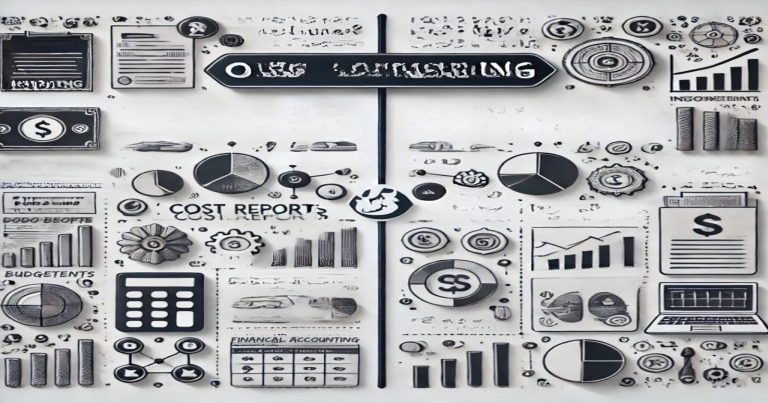The difference between Cost Accounting and Financial Accounting is in their ultimate purpose, audience, and reporting method. Cost accounting assists internal groups with controlling and minimizing costs, whereas financial accounting is employed to make up financial statements to report to outside parties. They are both important to the success of a business, but they are not the same thing. In this article, we will know what cost and financial accounting are, their respective advantages, and the difference between cost accounting and financial accounting is through rigorous comparisons.
What is Cost Accounting?
Cost accounting is the type of accounting that is responsible for the total production cost of any firm with respect to both the variable and fixed costs that arise. Cost accounting is a management tool that aids in the analysis of cost behavior, efficiency measurement, and improvement of internal control. Cost accounting is exclusive to the internal behavior of the company and provides management with data for decision-making to improve profitability.
Key Features of Cost Accounting
Cost accounting is unlike financial accounting in numerous ways. Here’s how it works:
- Inside focus: It is utilized solely by the internal management for improving performance.
- Detailed reporting: It covers detailed reporting on the costs of every product, process, department, and even activity.
- Multiple costing techniques:
- Job costing – custom production jobs.
- Process costing – mass production units.
- Activity-based costing – distributes overhead according to activities.
Benefits of Cost Accounting
Cost accounting has various advantages, allowing for internal decision-making:
- Cost Control: As various cost elements are analyzed, companies can eliminate inefficiencies. It makes budgeting a tool to plan for future financial requirements based on information regarding costs to date and trends in costs over the past.
- Profitability Analysis: Exposes profit margins for products and departments.
- Pricing Decisions: Enables the establishment of prices according to actual costs and not assumptions.
- Operational Efficiency: Reveals wastage and bottlenecks in the production process.
| Feature | Cost Accounting Advantage |
| Cost Analysis | Deep insight into the cost structure |
| Budgeting & Forecasting | Better planning and control |
| Performance Evaluation | Internal benchmark analysis |
| Profit Maximization | Identify high and low-profit areas |
What is Financial Accounting?
Financial accounting is the process of summarizing and reporting a firm’s financial transactions by way of organized financial statements such as the Balance Sheet, Income Statement, and Cash Flow Statement. External parties, such as investors, creditors, tax authorities, and regulators, mainly use this. Financial accounting aims to provide consistency and transparency about financial information through the application of guidelines and standards such as GAAP and IFRS.
Key Characteristics of Financial Accounting
This type of accounting fulfills a different purpose:
- External Reporting: Designed for outside stakeholders to evaluate company performance.
- Standardized Format: Will need to meet standards.
- Historical Focus: Examines previous performance and results.
- Legal Compliance: Mandated by law for corporations and public firms.
Advantages of Financial Accounting
Financial accounting is needed by companies to demonstrate their financial integrity and secure investment.
- Use of funds: Credibility and confidence within the marketplace.
- Legitimate Acts: It is essential to be compliant with the legal statutes and tax regulations.
- Investment Decisions: Brings about informed investor decisions regarding the performance of a company before financial investment.
- Credit Ratings: Assessment of the reliability of a company by rating agencies.
- Stakeholder Communication: Informs external stakeholders of company health.
Difference Between Financial Accounting and Cost Accounting
The difference is made clear by the explanation below, which is based on multiple aspects.
Key Comparison
| Aspect | Cost Accounting | Financial Accounting |
| Purpose | Decision-making and internal cost control | External reporting, monitoring of financial performance |
| Focus | Operational cost and efficiency management | Profitability and financial position |
| Audience | Internal management | External stakeholders (creditors, regulators, investors) |
| Time Orientation | Future and present | Historical |
| Standards | No specific standards (internal use) | Compliant with GAAP/IFRS |
| Reporting Format | Customized formats for in-house usage | Standardized financial reports |
| Type of Information | Detailed, detail-specific | Consolidated firm-level data |
| Frequency | Ongoing, as needed | Periodic (Quarterly/Annually) |
Important Differences
- Cost accounting emphasizes internal performance improvement.
- Financial accounting emphasizes compliance with the law and external financial requirements.
- The contrast between financial cost and management accounting emerges when we consider their audience, format, and focus area.
Both of these accounting techniques are complementary. Financial accounting gives the broad picture and cost accounting goes deep to identify means of saving costs and enhancing efficiency.
Difference Between Cost Accounting and Financial Accounting FAQs
1. What is the foremost difference between cost accounting and financial accounting?
Cost accounting deals with cost control for internal management and efficiency enhancement, while financial accounting deals with the preparation of financial statements for external users, like investors and regulators.
2. What is the primary difference between cost accounting and financial accounting Wikipedia?
Cost accounting is concerned with internal cost control, whereas financial accounting involves external reporting based on standard rules such as GAAP or IFRS.
3. What are the differences between cost management and financial accounting?
Cost management is about planning and controlling costs to make better business decisions. Financial accounting is about tracking and reporting overall financial performance for outsiders.
4. What are the similarities between business finance and cost accounting?
Both have to do with effectively managing money and resources. Both seek to enhance business performance through analysis and planning.
5. What are the differences and similarities between accounting and finance?
Accounting tracks and reports previous financial information, whereas finance concerns itself with dealing with current and future finances. Both are required for business decisions.


